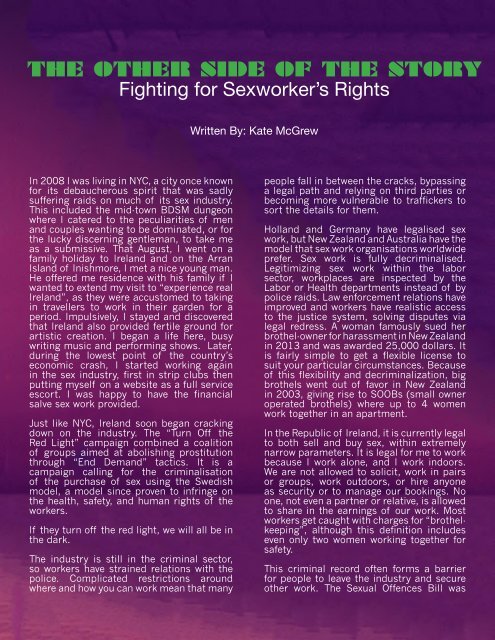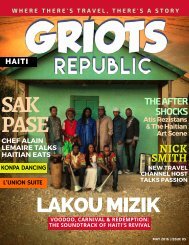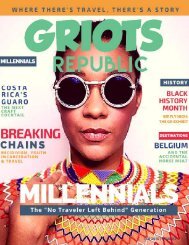GRIOTS REPUBLIC - An Urban Black Travel Mag - March 2016
ISSUE #3: IRELAND Profiles: Arlette Bomahou, Illa J, African Gospel Choir Dublin, Godfrey Chimbganda, Fabu D
ISSUE #3: IRELAND
Profiles: Arlette Bomahou, Illa J, African Gospel Choir Dublin, Godfrey Chimbganda, Fabu D
Create successful ePaper yourself
Turn your PDF publications into a flip-book with our unique Google optimized e-Paper software.
THE OTHER SIDE OF THE STORY<br />
Fighting for Sexworker’s Rights<br />
Written By: Kate McGrew<br />
In 2008 I was living in NYC, a city once known<br />
for its debaucherous spirit that was sadly<br />
suffering raids on much of its sex industry.<br />
This included the mid-town BDSM dungeon<br />
where I catered to the peculiarities of men<br />
and couples wanting to be dominated, or for<br />
the lucky discerning gentleman, to take me<br />
as a submissive. That August, I went on a<br />
family holiday to Ireland and on the Arran<br />
Island of Inishmore, I met a nice young man.<br />
He offered me residence with his family if I<br />
wanted to extend my visit to “experience real<br />
Ireland”, as they were accustomed to taking<br />
in travellers to work in their garden for a<br />
period. Impulsively, I stayed and discovered<br />
that Ireland also provided fertile ground for<br />
artistic creation. I began a life here, busy<br />
writing music and performing shows. Later,<br />
during the lowest point of the country’s<br />
economic crash, I started working again<br />
in the sex industry, first in strip clubs then<br />
putting myself on a website as a full service<br />
escort. I was happy to have the financial<br />
salve sex work provided.<br />
Just like NYC, Ireland soon began cracking<br />
down on the industry. The “Turn Off the<br />
Red Light” campaign combined a coalition<br />
of groups aimed at abolishing prostitution<br />
through “End Demand” tactics. It is a<br />
campaign calling for the criminalisation<br />
of the purchase of sex using the Swedish<br />
model, a model since proven to infringe on<br />
the health, safety, and human rights of the<br />
workers.<br />
If they turn off the red light, we will all be in<br />
the dark.<br />
The industry is still in the criminal sector,<br />
so workers have strained relations with the<br />
police. Complicated restrictions around<br />
where and how you can work mean that many<br />
people fall in between the cracks, bypassing<br />
a legal path and relying on third parties or<br />
becoming more vulnerable to traffickers to<br />
sort the details for them.<br />
Holland and Germany have legalised sex<br />
work, but New Zealand and Australia have the<br />
model that sex work organisations worldwide<br />
prefer. Sex work is fully decriminalised.<br />
Legitimizing sex work within the labor<br />
sector, workplaces are inspected by the<br />
Labor or Health departments instead of by<br />
police raids. Law enforcement relations have<br />
improved and workers have realistic access<br />
to the justice system, solving disputes via<br />
legal redress. A woman famously sued her<br />
brothel-owner for harassment in New Zealand<br />
in 2013 and was awarded 25,000 dollars. It<br />
is fairly simple to get a flexible license to<br />
suit your particular circumstances. Because<br />
of this flexibility and decriminalization, big<br />
brothels went out of favor in New Zealand<br />
in 2003, giving rise to SOOBs (small owner<br />
operated brothels) where up to 4 women<br />
work together in an apartment.<br />
In the Republic of Ireland, it is currently legal<br />
to both sell and buy sex, within extremely<br />
narrow parameters. It is legal for me to work<br />
because I work alone, and I work indoors.<br />
We are not allowed to solicit, work in pairs<br />
or groups, work outdoors, or hire anyone<br />
as security or to manage our bookings. No<br />
one, not even a partner or relative, is allowed<br />
to share in the earnings of our work. Most<br />
workers get caught with charges for “brothelkeeping”,<br />
although this definition includes<br />
even only two women working together for<br />
safety.<br />
This criminal record often forms a barrier<br />
for people to leave the industry and secure<br />
other work. The Sexual Offences Bill was














